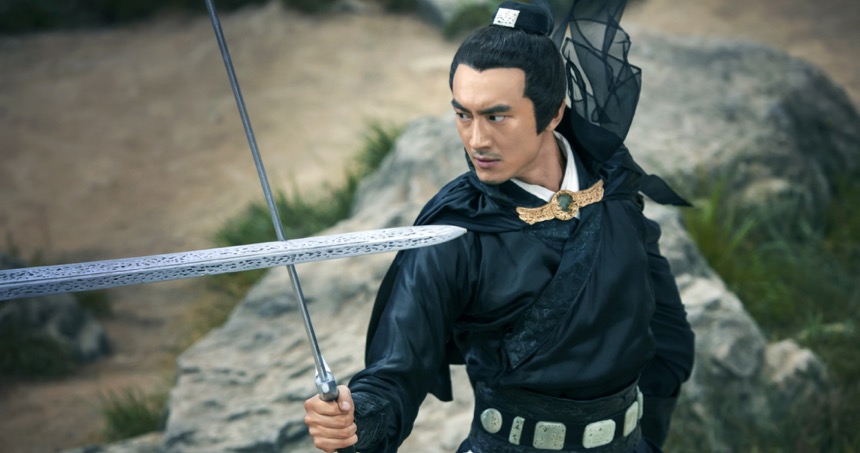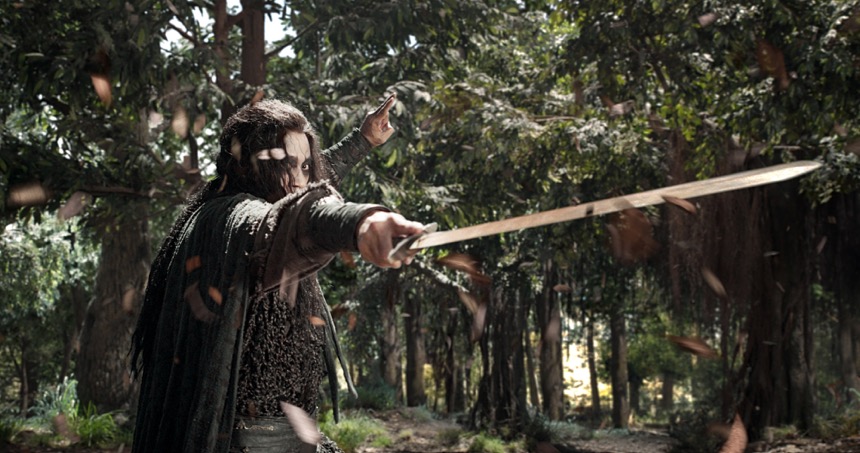Review: SWORD MASTER Honours Wuxia Tradition Through Bold Reinvention
Derek Yee directs, Tsui Hark produces and Kenny Lin, Peter Ho, Jiang Mengjie and Jiang Yuyan star in this visually ravishing 3D wuxia extravaganza.

Nearly 40 years after Chor Yuen launched his acting career in the Shaw Brothers classic Death Duel, director Derek Yee returns to Gu Long’s source novel for a ravishing new adaptation. With Tsui Hark producing and action choreography from Yuen Bun and Dion Lin, Sword Master is a shamelessly old-fashioned swordplay romance that pays homage to the legacy of studio-bound wuxia dramas, while simultaneously embracing cutting-edge new technology. CGI backdrops and immersive 3D photography combine seamlessly with balletic wirework and an age-old story of duty and heroism that should delight audiences around the world.
Yee casts Kenny Lin Gengxin in the role that made him a star back in 1977, as Third Master Hsiao Feng, proclaimed throughout the land as the greatest living swordsman. But when word spreads that he has died, the entire kingdom is thrown into disarray. The Hsieh Clan, under the leadership of Hsiao Feng’s father, hang up their swords and retreat from the martial world, while his betrothed, Chiu-ti (Jiang Yuyan), wants proof that the love of her life is dead. She also has desires to lead her Mu Yung Clan in a takeover, something encouraged by her adoring page, Chu.
Hsiao Feng is not dead, however, but has gone into hiding. When first we meet our hero it is as “Ah Chi”, a drunken nobody working as errand boy for a brothel in Bitter Sea Town. There he catches the eye of prostitute Li (Jiang Mengjie), even taking a blade for her from a dissatisfied customer, but despite her advances, Ah Chi remains chaste, clearly preoccupied by weightier thoughts.

Stealing the show, however, is Peter Ho as Yen, a rival swordsman who had vowed to defeat Hsiao Feng and become the best in the land. On hearing of the Third Master’s death, he retreats into obscurity. Sporting skull-like facial tattoos and hauling his own tombstone on his back, Yen takes up residence in a graveyard outside Bitter Sea Town, vowing never to use his 13 Sword fighting style again.
Meanwhile, Chiu-ti unleashes Chu and his Divine Might death cult, who rampage through the kingdom taking on all comers. When Li and her family is threatened, Ah Chi is finally forced to reveal his true identity, with events escalating towards a climactic showdown between Divine Might and the Hsieh Clan of Supreme Sword Manor.
Tsui Hark has spent the past few years taking bold strides forward in the realm of 3D, working with some of the industry’s best fight choreographers to utilise the depth of field to great effect in the likes of Flying Swords of Dragon Gate and Taking of Tiger Mountain. Serving as producer here for Derek Yee, Tsui’s influence can be felt strongly in Sword Master’s numerous action sequences, not least the climactic battle at Supreme Sword Manor, with poisoned grappling hooks appearing out of the fog to attack their victims. As acrobatic fighters perform impossible manouevers on invisible wires, Yee's swooping cameras create a dizzingly kinetic experience.

Elsewhere, Yee conjures up gorgeous cinematic landscapes and settings as elaborate as they are self-consciously artificial. Yee is not aiming for realism here, but rather a heightened visual aesthetic in the same way the great studio pictures of yesteryear would embrace their sets so enthusiastically. From blossoming trees to mist-covered mountain tops, Sword Master exists in a magical realm of mythology and legend, a step outside our reality, yet fuelled and driven by the same heightened emotions.
Hsiao Feng’s own legend weighs heavy on his shoulders, as he must live with being revered and feared in equal measure. As the greatest swordsman, he faced constant challenge from warriors desperate to forge their own mythic identity, and for that reason, faked his own death and disappeared. In doing so, however, Hsiao Feng also spurned Chiu-ti, breaking off their arranged marriage that was set to unite the rival clans of Hsieh and Mu Yung. His decision has tragic repercussions, not least the bruising of Chiu-ti’s already fragile ego, who also proves to be an accomplished sword fighter in her own right.
Despite Hsiao Feng’s quiet humility and Li’s naive yet ultimately good-natured efforts to provide for her family, it is Ho’s lone swordsman Yen who emerges as the film's most charismatic character. After a life spent in the shadow of his greatest rival - to the point he is even mistaken for the Third Master - Yen is devastated when robbed of the chance to test his skills against him. Initially, Yen proclaims that if he cannot be the hero he must become the villain, although later allies himself with Hsiao Feng when greater forces of evil emerge.
Personal and reverent, yet pulsating with visual invention, Sword Master is a passionate love letter to Chinese cinema’s most quintessential genre, but also a bold exploration into wuxia’s visual language. Sword Master is pioneering, experiential cinema, simultaneously steeped in decades of tradition and mythology, which must, as its hero learns, be embraced if it is ever to be overcome.

Do you feel this content is inappropriate or infringes upon your rights? Click here to report it, or see our DMCA policy.






